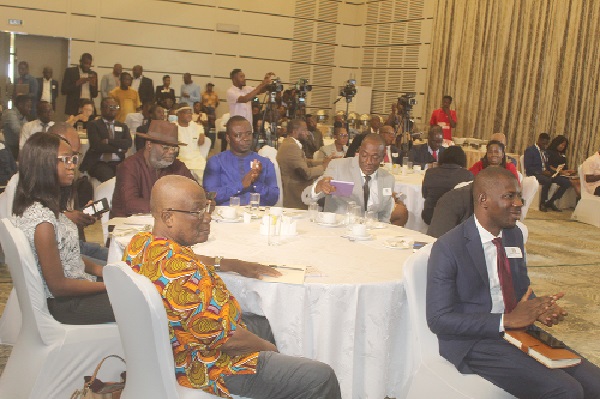
IMF programme designed to be extended — Prof. Bokpin
Professor Godfred A. Bokpin of the University of Ghana has questioned the government's ability to fulfil the three-year extended credit facility (ECF) arrangement with the International Monetary Fund (IMF) within the agreed-upon timelines.
At the second edition of the Graphic Business/ Stanbic Bank Breakfast meeting, he stated that the existing scheme was designed with an extension in mind, taking into account the planned targets and the modifications needed to restore debt sustainability, which would be difficult to achieve, especially with the 2024 general election approaching.
To substantiate his point, he stated, “If you look at how we have managed ourselves, especially in an election year, you can almost predict with certainty that there will be an extension”.
After 10 months of deliberations and negotiations, Ghana eventually won agreement from the International Monetary Fund (IMF) Executive Board for a three-year budget support plan targeted at restoring macroeconomic stability and debt sustainability.
The extended credit facility (ECF), which would see the government receive a total of $3 billion, is also intended to promote structural changes and aid the country’s economic recovery after two years of economic hardships.
Ghana's IMF programme is supported by the post-COVID-19 Programme for Economic Growth (PC-PEG), which is the government's blueprint for addressing economic challenges, restoring macroeconomic stability, bringing debt to sustainable levels in the medium term, supporting structural reforms, promoting growth, and protecting the poor and vulnerable.
The PC-PEG's primary goals include, among other things, restoring fiscal sustainability and minimising fiscal risks, particularly risk from contingent obligations from state-owned companies (SOEs).
It is also expected to re-anchor inflation expectations by attaining low and stable inflation, to improve the exchange rate regime, to restore investor confidence, to re-establish market access, and to open up new funding sources.
The PC-PEG is also intended to boost resilience to economic shocks, improve the country's sovereign credit ratings, and regain access to international capital markets.
Debt Restructuring
Prof. Bokpin indicated that debt restructuring would account for the majority of fiscal adjustment, emphasising that domestic debt reform was not yet complete because the government had not yet reorganised half of its domestic debt.
“In terms of domestic debt restructuring, we are not finished; we have completed less than 50 per cent of the domestic debt restructuring.
“At the end of 2022, our total domestic debt was around GH¢259 billion; so far, we have restructured only 85 per cent of GH¢98 billion, so as we speak, we have more than GH¢123 billion of domestic debt that needs to be restructured,” he stated.
He detailed that those domestic obligations included cocoa bills, pension funds, the Bank of Ghana's overdraft extension to the government, and treasury bills that have been spared from the procedure.
On the external front, the government is in talks with the Official Creditor Committee to streamline bilateral loans totalling $5.4 billion, and with commercial creditors whose debt stand at $14-billion.
Between 2023 and 2026, the government expects to reduce its foreign debt by $10.5 billion through external restructuring but Prof. Bokpin believes this is too much to ask and that there are risks ahead because there is no guarantee that the country's external bilateral and commercial creditors will show up and write down some of its debts.
He also stated that in addition to the IMF programme conditions, those bilateral partners may set further conditions before providing the government with any type of relief.
Sustainability
The Executive Director of the Africa Centre for Energy Policy (ACEP), Dr Benjamin Boakye, also spoke at the meeting, saying that for the country to become sustainable and avoid another IMF programme in the near future, government policies and programmes must be rigorously scrutinised to ensure value for money.
He regretted that the government had wasted a lot of public money on unproductive initiatives that provided little value for money.
For example, he stated that the government spent more than GH¢250 million to build irrigation dams in a number of communities with the promise that they would boost agricultural production and create value, despite the fact that ‘most of the dams are inoperable; so, it generated no value, but people took money to build these dams,”
He emphasised the need of avoiding another IMF bailout because research has proven that each plan is more burdensome than the previous one, therefore "we are to avoid it, and citizens must demand accountability," he said.